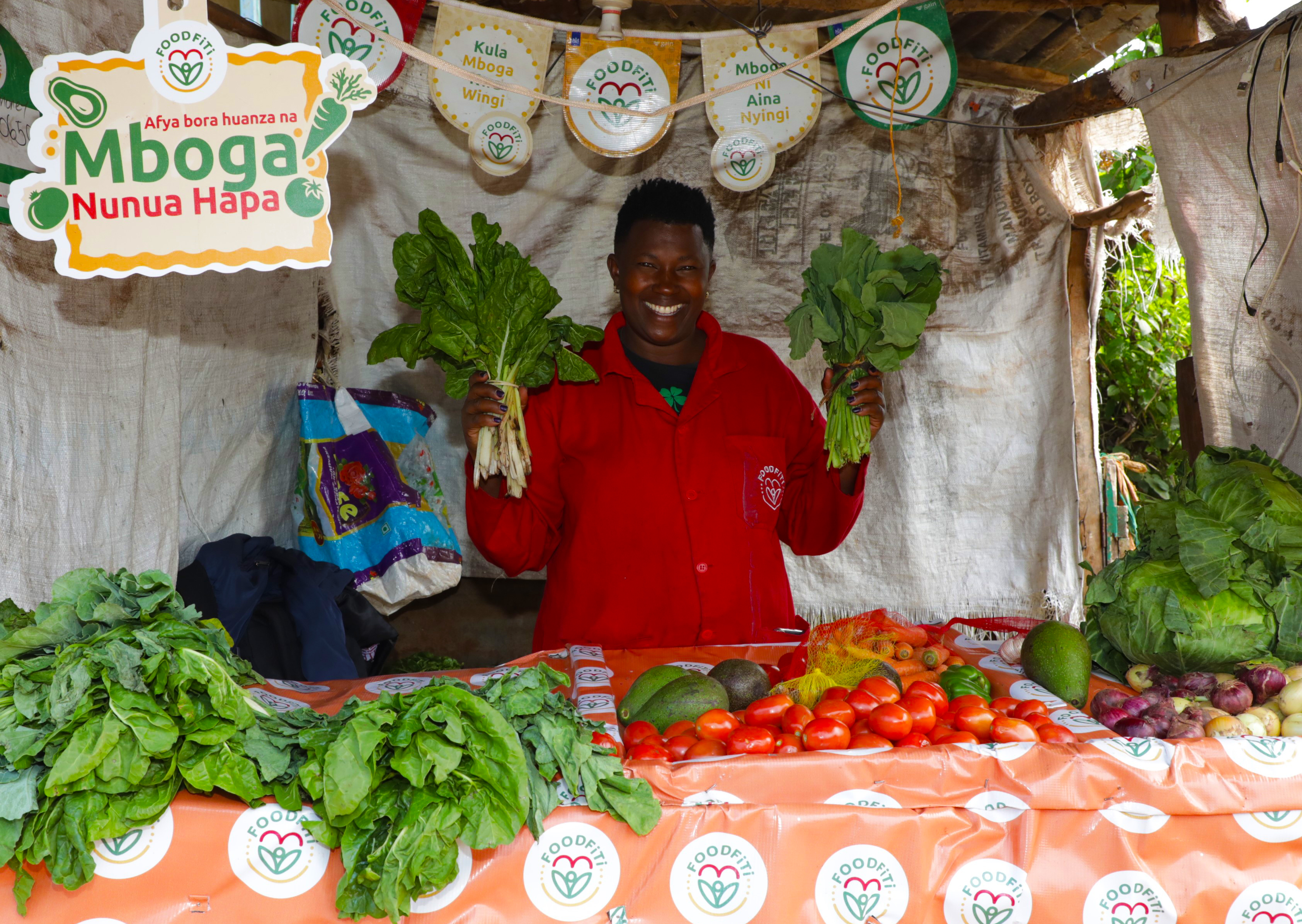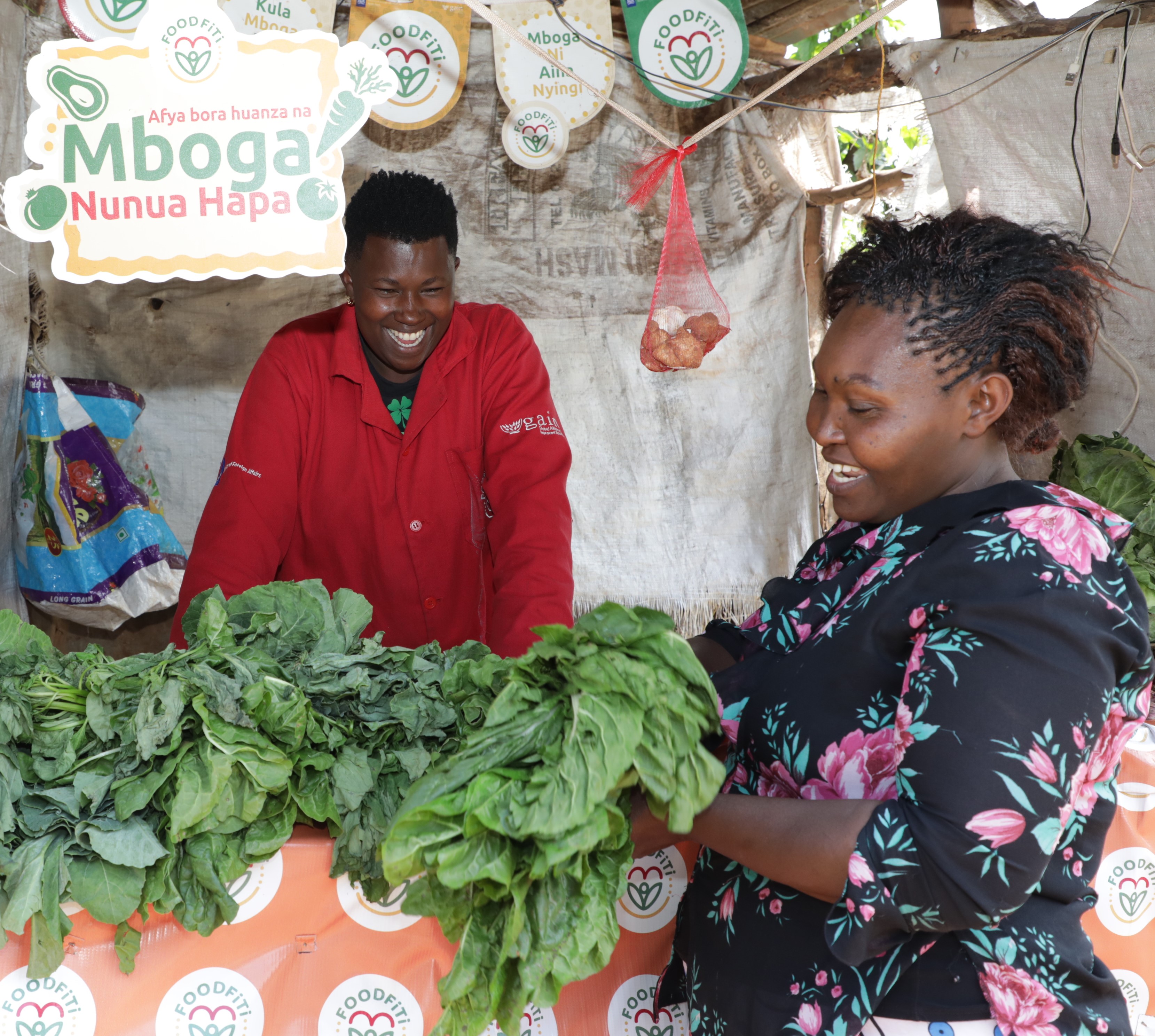Mary Wamuyu Gathemia, a 41-year-old mother of two, runs a vibrant vegetable stall in Muthumi Village, Muguga Ward, Kabete Sub-County, Kiambu County. For years, Mary operated a small general shop selling household items and a few groceries. However, her shop struggled to break even, and she was on the verge of closing it to focus on being a housewife.

A happy Mary Wamuyu in her vegetable stall at Muthumu in Kiambu County
Her turning point came in February 2024, when she met the FoodFiti team during their recruitment of mama mbogas for the Vegetables for All project. Encouraged by the opportunity to revamp her grocery business and gain new skills, Mary signed up as a FoodFiti last-mile vegetable vendor.
“I saw this as a chance to transform my grocery business, earn more income, and at the same time impact my community by providing them with fresh, healthy vegetables. I couldn’t let such an opportunity pass me by,”
- she recalls.
FoodFiti is a brand developed and used by Global Alliance for Improved Nutrition (GAIN) to advocate for increased consumption of nutrients dense foods. GAIN with funding from the Dutch Ministry of Foreign Affairs is implementing the Vegetables for All project through FoodFiti. The project seeks to increase vegetable consumption among 1.1 million urban and peri-urban consumers from low-income households in Kenya.
Transformation Through FoodFiti
After attending several FoodFiti trainings on business management, customer care, and food safety, Mary made a bold decision to close her general shop and start afresh by setting up a dedicated vegetable stall near her residence. In July 2024, she placed her first order of vegetables, primarily kales, cabbages, and spinach for her new vegetable stall.
As she continued to participate in the trainings, Mary learned the importance of offering a variety of vegetables to promote healthier diets. She gradually expanded her stock to include indigenous and nutrient-rich varieties such as managu (Black nightshade), terere (Amaranthus), mrenda (Jute mallow), mitoo (Slenderleaf), capsicum, ginger, coriander, and avocados.
“Before I joined FoodFiti, I was only selling kales, cabbages, and spinach. Now I stock more than 10 different vegetable varieties, and my customers are excited to try them,” says an elated Mary.

Mary Wamuyu selling a variety of vegetables to her customer
Support That Changed Her Business
GAIN, through FoodFiti, linked Mary to market facilitators who source vegetables from farmers practicing good agricultural practices (GAP). This ensures that Mary receives safe, fresh, and traceable produce delivered directly to her stall.
She also received practical support, including a PVC display cover to protect her vegetables from dust and a waste bin to maintain a clean and hygienic environment.
In addition, GAIN branded her stall using FoodFiti logo-branded canvas and colourful buntings carrying key messages on the importance of frequently consuming a variety of vegetables. This branding enhanced her stall’s visibility in the community and attracted more customers who associated the FoodFiti brand with quality and healthy choices. These small but impactful tools have enhanced the appeal of her stall and boosted consumer trust.
Impact on Her Family and Community
Mary’s transformation is not limited to her business. Through FoodFiti’s cooking demonstrations, she learned creative ways of preparing vegetables, leading her family to adopt a more diverse and nutritious diet.
“At first, my children didn’t like the new vegetable varieties. But now, after trying new recipes learned during FoodFiti cooking demos, they enjoy them,” Mary shares with a smile.
Armed with better marketing skills, Mary uses community meetings to promote her business. As a result, her customer base has grown from 7 customers a day to over 30, and her daily profit has increased from KSh. 200 (USD 1.5) to KSh. 1,200 (USD 9).
“I am very happy I didn’t quit this business. Thanks to the FoodFiti team’s encouragement, I can now pay school fees for my children in my dream school and support my husband in meeting household needs,” she says proudly.
Future Plans
Mary envisions further growth for her business. In the next year, she plans to expand her stall, double her vegetable orders, and lease a piece of land to grow vegetables for both her household and commercial use. She also aims to open a second outlet and employ her close friend, who has supported her at the current stall when she attends community events or meetings.

Mary Wamuyu (left) placing orders with her FoodFiti market facilitator
A True Testament of Change
Mary’s story demonstrates the power of targeted support, skills development, and strong supply chains. By empowering women like Mary, the Vegetables for All project is not just improving businesses but also transforming lives, families, and entire communities.